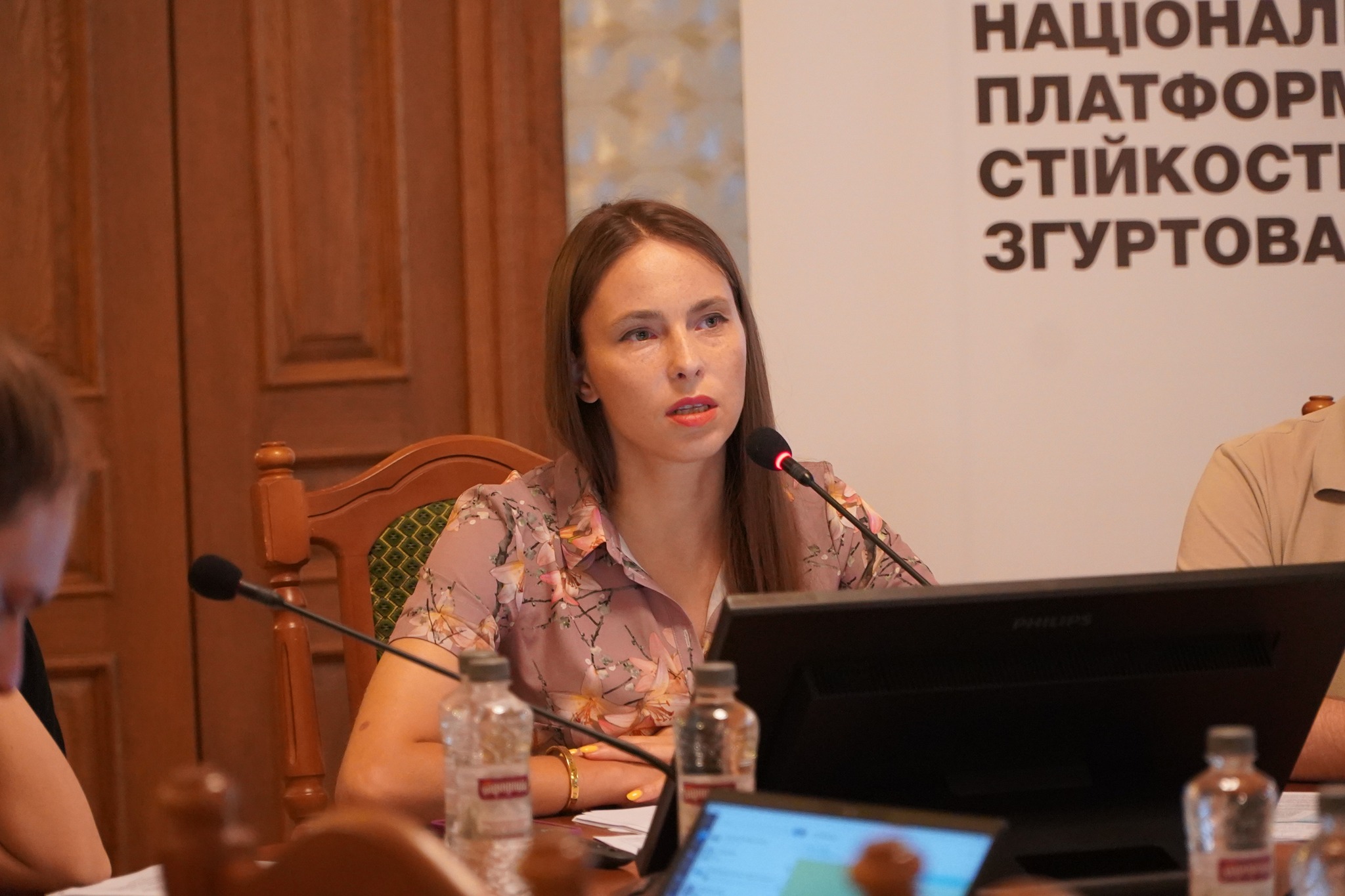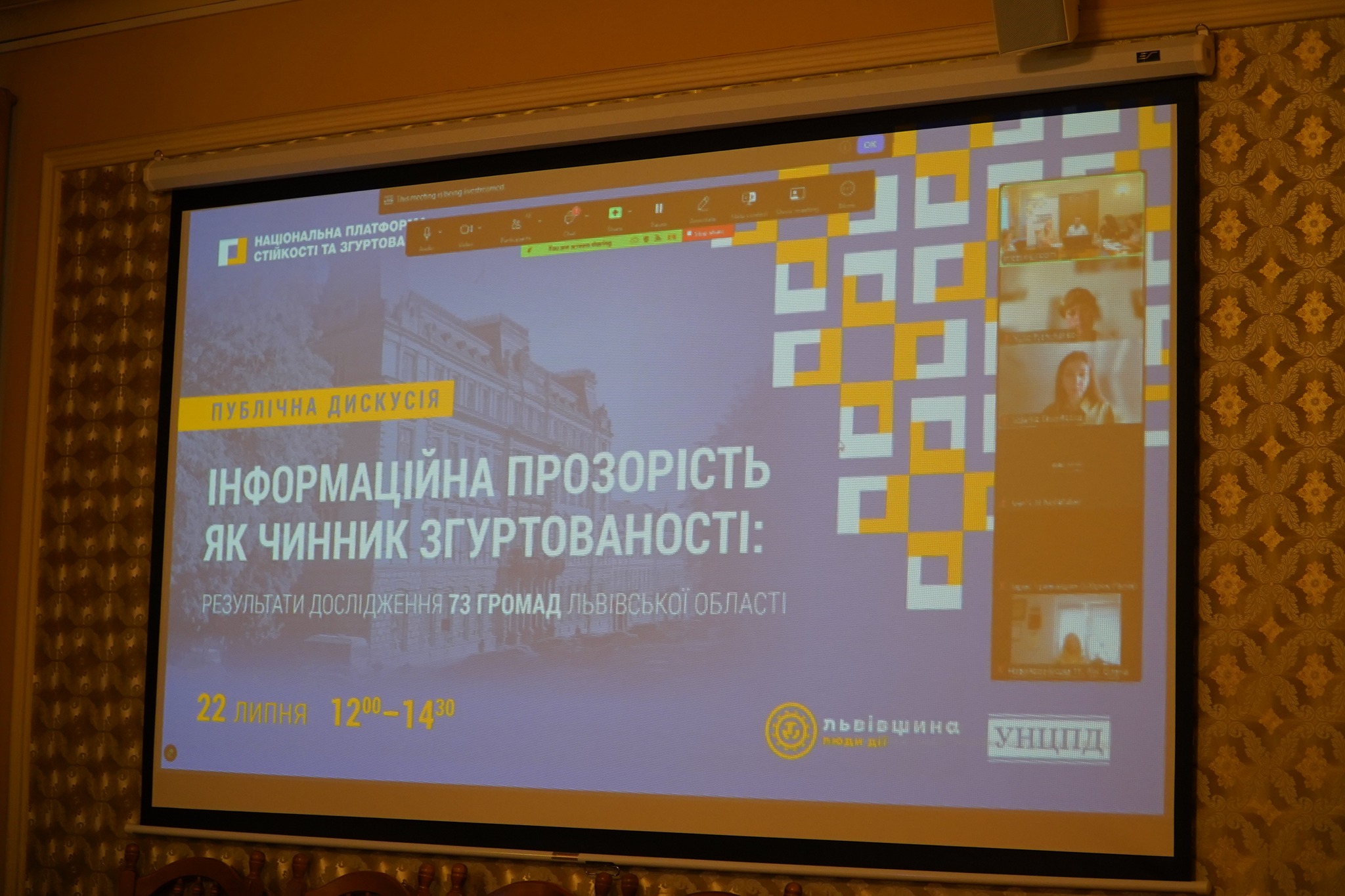On July 22, 2025, a public discussion entitled "Information transparency as a factor of cohesion: results of a study of 73 communities in the Lviv region" was held in Lviv, organized by the National Platform for Resilience and Social Cohesion.
The event was moderated by Yulia Gvozdovych, advocacy manager of the National Platform in the Lviv region.
At the beginning of the discussion, Oleksandr Kulepin, Deputy Head of Lviv Oblast Military Administration (LOMA) for Digital Development, Digital Transformation, and Digitalization, gave a welcoming speech. He noted that without transparency, there is no trust, and without trust, there is no cohesion.

Valeriia Skvortsova, executive director of the Ukrainian Center for Independent Political Research (UCIPR), clarified that the development of democratic instruments is now more relevant than ever, because with the restrictions on electoral democracy under martial law, participatory democracy must be developed. The UCIPR has been working on this issue for over 30 years and is therefore ready to contribute to implementing the recommendations based on the study results.

As Yuliia Tyshchenko, co-founder of the National Platform, stated, the platform focuses on social resilience, which allows us to respond adequately and promptly to crises and shocks at both the state and community levels.
She also emphasized that social cohesion is the "glue" or "cement" that holds society together. Cohesion is strengthened by adequate communication between local authorities and communities and the availability of information about the actions and decisions of local self-government bodies (LSG). These mechanisms enable people to become involved in the life of their communities.
Yuriy Radelitskyi, head of the Lviv Oblast Council's standing deputy commission on agro-industrial complex, entrepreneurship, and investment, agreed with this. Every member of the community should participate in its life. However, in practice, the tools of participatory democracy do not always work as they should due to a lack of budget. This problem is particularly relevant for small and remote communities, indicating inevitable decentralization mistakes.

Yulia Gvozdovych presented the main results of the study "Information Transparency as a Factor of Cohesion," which covered 73 communities in the Lviv region. The researcher asked, "How can community residents convey their ideas and suggestions to local authorities and thus exercise their civil rights?" Therefore, the websites and other web resources of local self-government bodies were checked for transparency from the point of view of a simple user.
The indicators used to form the assessment were divided into four groups: accessibility of public participation tools; access to decision-making processes; access to information about the work of local self-government bodies; and cooperation between local self-government bodies and the public. In the latter case, the number of mentions of civil society institutions on local self-government websites over one month was counted.
According to the final rating, Lviv, Drohobych, Boryslav, and Stryi are the most informationally transparent communities. About 20 communities received average scores. However, the majority have low ratings—not always, but as a rule, these are small and remote rural and settlement communities.
The practical benefit of the study is that it identified several problems. Moreover, solving them often does not require additional funds. For example, the community charter is published in only 18 communities, while in 55 it is not. Forty-two communities do not publish the regulations of their councils, which is necessary for residents to participate in meetings. Only three communities have published reports of local council deputies. Fifty-six communities have no information about deputies' meetings, and 48 have no reports on the activities of the community head. Twenty-one communities publish information for IDPs, while 52 do not.
In most communities, there were fewer than ten monthly mentions of joint projects between local authorities and the public, and in 21 communities, there were no such mentions at all. Lviv is the leader with 78 mentions.

The researcher identified common problems such as chaotic and unstructured websites, insufficient information about local council members, and a lack of instructions on using participatory democracy tools.
The proposed recommendations do not require significant financial costs or the creation of new structures. Everything depends on the willingness to restore trust, which is a fundamental factor in the stability of communities during wartime and in establishing democratic practices in Ukraine.
Nataliia Khomyk, acting head of the LOMA Digital Development Department, spoke about the community digital transformation index. Lviv ranks first in Ukraine (index 38). The ranking was determined by taking into account the so-called "weighting coefficients": digital economy (10%), digital skills (15%), digital infrastructure (30%), and digitization of public services, i.e., e-democracy (45%). The last and most significant factor was the subject of the study that Ms. Yuliia talked about.
Access to information is required by law. Local government websites must contain information for internally displaced persons, video reports of meetings, information about public budget project competitions, the ability to submit electronic appeals, file electronic petitions, and receive electronic consultations.
According to the expert, digitalization is an irreversible process that increases the efficiency of local authorities: "Data should move, not people."
According to Oleh Saakian, co-founder of the National Platform and political scientist, a shift towards greater openness during the war is already an achievement. Participatory democracy becomes extremely important when electoral mechanisms are suspended, strengthening the legitimacy of government decisions.

Maksym Latsyba, an expert at the Ukrainian Center for Independent Political Research, agreed with the political scientist. During the war, representative democracy is suspended, so the question of how to build trust in the authorities arose. Only through participatory democracy, that is, involving citizens in management decisions. Such involvement improves the decisions themselves — it is beneficial to a wise leader.
An appropriate legislative framework has been developed to implement participatory democracy. Maksym Latsyba, an expert at the UCIPR, mentioned the Law "On People's Power." According to this law, local government websites must publish much information. In addition, the law contains clear deadlines for such publication.

At the same time, Maksym Lukinyuk, an expert on developing public participation mechanisms at the Ukrainian Center for Independent Political Research, recalled that work is currently underway on methodological recommendations for a draft model charter for territorial communities. The Ukrainian Center for Independent Political Research experts are working on the document as part of a working group under the Ministry of Community and Territorial Development of Ukraine.
"For six months now, the law has required communities to publish written reports from the head, deputies, and heads of executive bodies, hold public hearings on the budget before its adoption, and ensure the participation of residents in the decision-making process," Maksym Lukinyuk emphasized.
Representatives of local self-government bodies and public and charitable organizations from various communities in the Lviv region participated in the subsequent discussion. They also voiced the problems that, in their opinion, hinder information transparency. They often mentioned the lack of personnel for digitalization and public relations. Therefore, the event participants believe separate departments with a clear structure are needed.
"The study shows the real facts and points out where the problems lie," noted Maksym Latsyba. Therefore, it is a roadmap for communities that should be used.
Read also: Legislative Changes for the Public Sector - Digest for the First Half of July 2025 from the UCIPR
